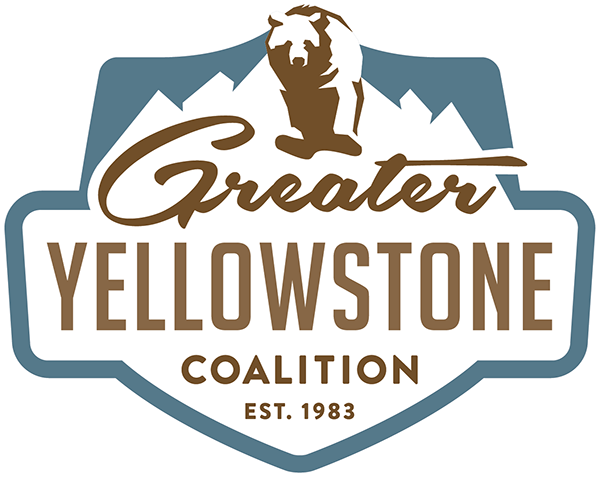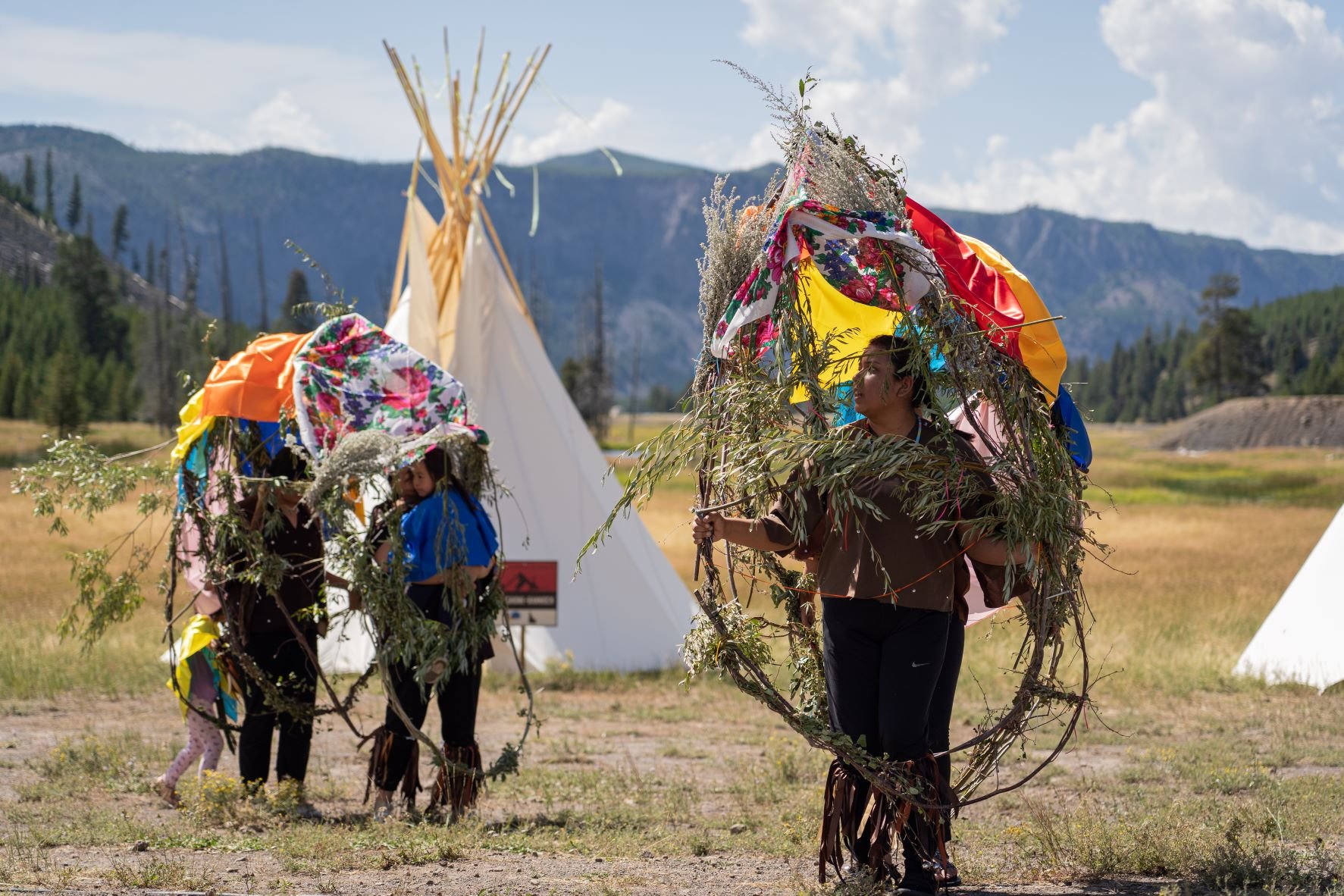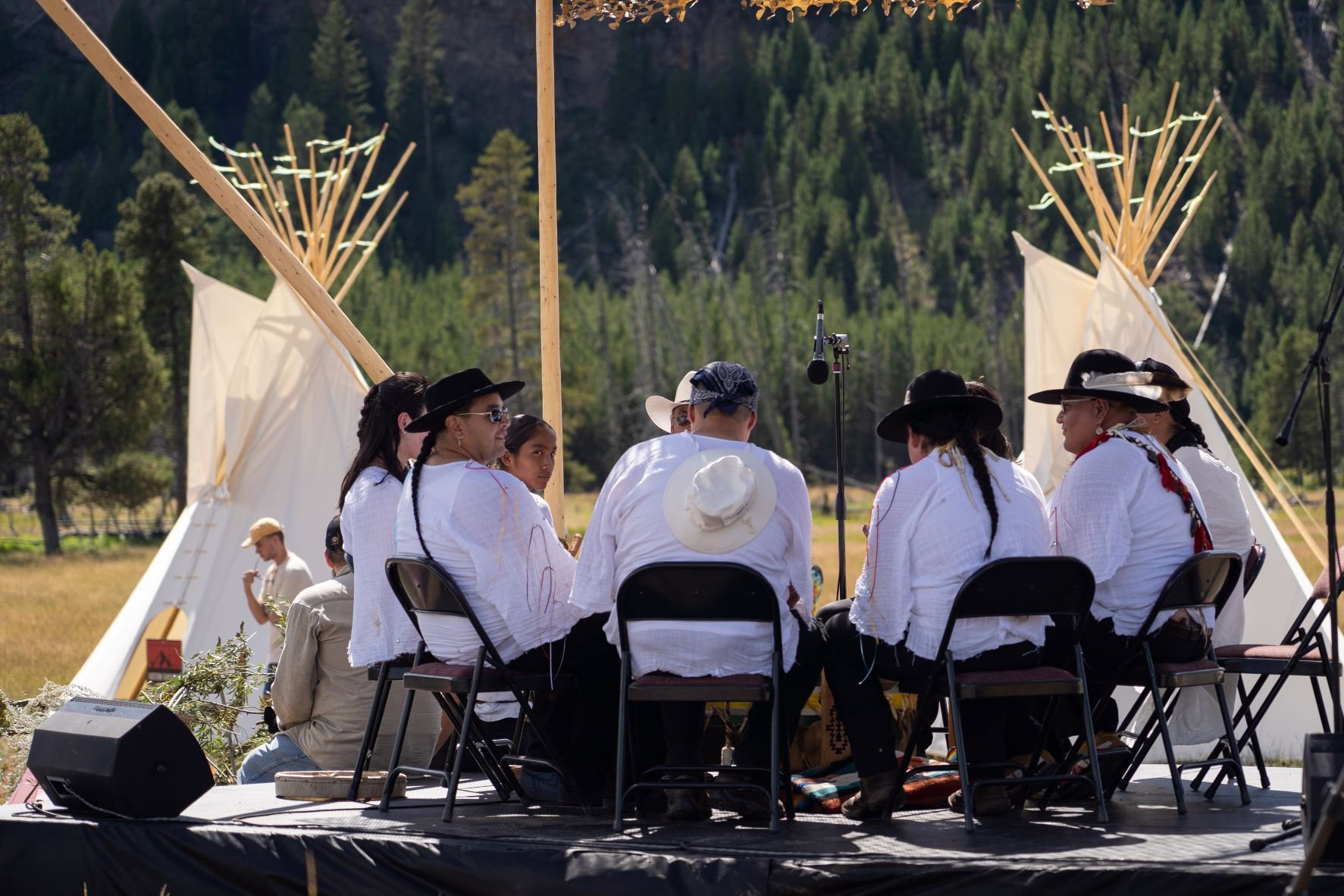Yellowstone Revealed: Land rematriation through buffalo restoration
Since time immemorial, the Greater Yellowstone Ecosystem continues to be stewarded by Indigenous people who view its lands, waters, and wildlife as sacred. The Indigenous way of caring for the land acknowledges its life-giving energy, is centered on reciprocity, and uses Traditional Ecological Knowledge to keep the ecosystem in balance. Today close to 50 tribes, including the Apsáalooke/Crow, Hinono’eino’/Northern Arapaho, Sosonrih/Eastern Shoshone, and other Indigenous peoples, are keepers of this knowledge and retain deep connections to this remarkable place.
2022 marks the 150th Anniversary of the creation of Yellowstone National Park. To show and celebrate the historic and continued presence of Indigenous people in Greater Yellowstone, Mountain Time Arts with support from the Greater Yellowstone Coalition and other partners hosted Yellowstone Revealed. Yellowstone Revealed is a series of place-based projects by Indigenous artists and showcases non-invasive, temporary projects that took place August 17-28, 2022 in Yellowstone National Park.
Wind River Conservation Organizer Colleen Friday (right) tabling at the All-Nations Teepee Village during Yellowstone Revealed. (Photo GYC/Emmy Reed)
I was excited to attend the Yellowstone Revealed events since, in addition to being a Wind River conservation organizer for the GYC Wind River office, I am also an artist. I interweave my creative work with my studies in rangeland ecology, environment, and natural resources with Arapaho symbolism and culture. It was important to support another Northern Arapaho artist doing a project with deep meaning to our people.
I was invited to camp with Patti Baldes and team for the duration of their time at Yellowstone Revealed. Our Greater Yellowstone Coalition Wind River office had an information table at the All-Nations Teepee Village. We met and talked with tourists, national park staff, and everyone who came by our table took photos of our Yellowstone National Park Tribes map.
Dancers and their buffalo sculptures. The buffalo sculptures were built using willow branches, red willow (water birch) branches, sage, twine, and silk handkerchiefs. (Photo GYC/Emmy Reed)
REMATRIATE is a dance performance created by Patti Baldes focusing on land rematriation through buffalo restoration. Patti and Jason Baldes have been crucial to buffalo restoration on the Wind River Reservation. As a result of their advocacy more than 100 bison now call Shoshone and Arapaho Tribal lands their home. The performance consisted of six buffalo sculptures and twelve dancers. Ten of the twelve dancers were matriarchs and their daughters from the Wind River Reservation. The dancers danced to a song titled “Drums” (written by Peter Lafarge) performed by Northern Arapaho singer, Christian Wallowingbull, and traditional songs sung by a drum group consisting of ten singers from the Wind River Reservation.
The drum group during the REMATRIATE performance. (Photo GYC/Emmy Reed)
I was able to be at the Tuesday REMATRIATE rehearsal. After the first performance run-through, a buffalo bull from the Yellowstone herd appeared from the trees to the north of the All-Nations Teepee Village. It was a great surprise and those of us present had a general feeling of receiving a blessing from the buffalo nation. Of the multiple performances of REMATRIATE, the second performance held in front of Old Faithful was the most powerful for me. The audience watched as a gooseneck stock trailer, specially built to transport bison to the Wind River Reservation and painted with the words “LAND BACK” and “REMATRIATE” was backed up the paved walkway in front of Old Faithful.
REMATRIATE performance attendees were encouraged to participate in the round dance at the All-Nations Teepee Village. (Photo GYC/Emmy Reed)
A quiet suspense built as we heard the growing sound of bells and stomping coming from inside. The crowd waiting seemed on edge and didn’t know what to expect. Finally, the gate was opened and revealed the buffalo sculptures. The six buffalo sculptures were built using willow branches, red willow (water birch) branches, sage, twine, and silk handkerchiefs. These buffalo were being animated and brought to life by the women and children inside them. They began gently bobbing to a traditional song and then emerged from the sculptures to participate in several round dances with the audience. The round dances grew larger with each additional dance and the evening ended with the eruption of the Old Faithful geyser.
The REMATRIATE group after their first performance at Yellowstone Revealed. (Photo GYC/Emmy Reed)
There are at least 49 Tribes with ancestral connections to Yellowstone. Yet, unfortunately, mention of Indigenous People, historically or contemporarily is extremely scarce in the permanent interpretative signage and displays throughout the park. The significance of Indigenous presence and participation in YNP is that it raises awareness and helps drive home the message that Indigenous People are still here and our cultural attachment to our homelands must be honored and understood. Hunting rights, traditional use and gathering, consultation, and restoring Indigenous management practices to park service lands is of utmost importance. Indigenous connections, values, and beliefs have a crucial role in protecting the well-being of the land, water, and wildlife of Yellowstone National Park and the Greater Yellowstone Ecosystem.
(L-R) The Greater Yellowstone Coalition’s senior Wind River conservation associate Wes Martel, deputy director of conservation Charles Drimal, executive director Scott Christensen, and Wind River conservation organizer Colleen Friday at Yellowstone Revealed. (Photo GYC/Emmy Reed)
The Greater Yellowstone Coalition is dedicated to working with all people to protect the lands, waters, and wildlife of the Greater Yellowstone Ecosystem, now and forever. Our Tribal work protects and restores Indigenous conservation priorities that honor cultural landscapes, Tribal rights, and way of life.
Thank you for your support.
—Colleen Friday (Northern Arapaho), Wind River Conservation Organizer







